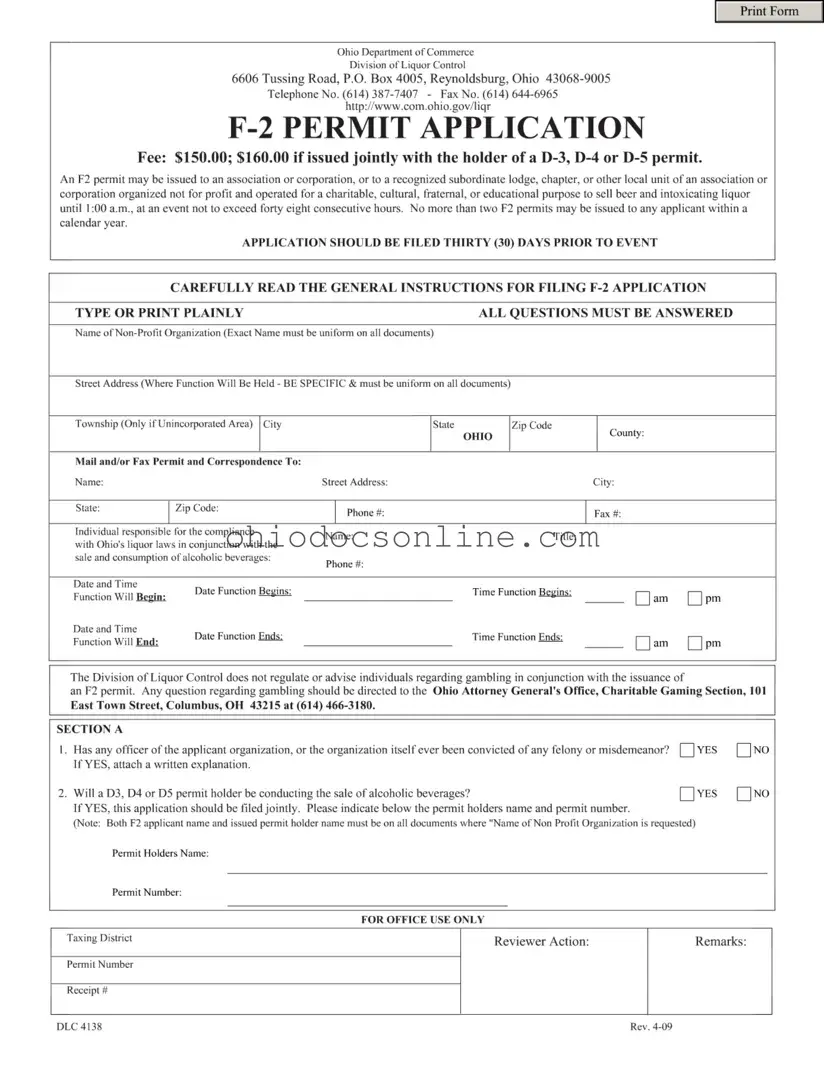Ohio F 2 Permit Template in PDF
Documents used along the form
The Ohio F-2 Permit is a crucial document for non-profit organizations looking to sell alcoholic beverages at events. However, several other forms and documents are often required or recommended to ensure compliance with state regulations. Below is a list of five important documents that complement the F-2 Permit application.
- Ohio D-3, D-4, or D-5 Permit: These permits are required for businesses that wish to sell specific types of alcoholic beverages. If the F-2 application is filed jointly with one of these permits, it allows for more streamlined operations during the event.
- Certificate of Good Standing: This document verifies that the non-profit organization is legally registered and in compliance with state regulations. It is often required to prove the legitimacy of the organization applying for the F-2 Permit.
- Event Liability Insurance: This insurance protects the organization against potential claims arising from accidents or injuries that may occur during the event. Many venues and regulatory bodies require proof of insurance before granting permits.
- Bylaws of the Organization: These are the governing rules of the non-profit. They outline the organization's purpose, structure, and procedures, and may be requested to confirm that the organization is operating within its stated mission.
- Tax Exempt Status Documentation: This document shows that the organization is recognized as tax-exempt under IRS regulations. It may be necessary to demonstrate that the organization is indeed a non-profit entity eligible for the F-2 Permit.
Gathering these documents not only facilitates the application process but also helps ensure that the event operates smoothly and legally. By being well-prepared, organizations can focus on their mission while successfully managing their event.
Dos and Don'ts
When filling out the Ohio F-2 Permit form, there are important dos and don'ts to keep in mind to ensure a smooth application process. Below is a list of guidelines to help you navigate the form effectively.
- Do read the general instructions carefully before starting the application.
- Do type or print clearly to avoid any misunderstandings or errors.
- Do ensure that the name of the non-profit organization is uniform across all documents.
- Do file the application at least thirty (30) days prior to the event to allow for processing.
- Do answer all questions completely to prevent delays in your application.
- Don't leave any questions unanswered, as this can result in your application being rejected.
- Don't submit the application without confirming that all required documents are attached.
- Don't assume that past permits will guarantee approval; each application is evaluated on its own merits.
- Don't forget to provide a detailed explanation if any questions require additional information.
Key takeaways
When filling out the Ohio F-2 Permit form, keep the following key takeaways in mind:
- Application Fee: The fee for the F-2 permit is $150.00, or $160.00 if issued jointly with a D-3, D-4, or D-5 permit holder.
- Eligibility: This permit is available to non-profit organizations and their subordinate units for events that serve beer and intoxicating liquor.
- Event Duration: The F-2 permit allows the sale of alcoholic beverages until 1:00 a.m. at events lasting no more than 48 consecutive hours.
- Limit on Permits: An applicant can receive a maximum of two F-2 permits in a calendar year.
- Filing Timeline: Submit the application at least 30 days before the event to ensure timely processing.
- Complete Information: Fill out all sections of the application, ensuring the name of the non-profit organization is consistent across all documents.
- Compliance Responsibility: Designate an individual responsible for compliance with Ohio’s liquor laws in relation to the event.
- Financial Proceeds: Clearly indicate whether the organization will receive 100% of the proceeds from the event.
- Not-for-Profit Verification: Be prepared to provide evidence of the organization’s not-for-profit status if requested by the Division of Liquor Control.
- Signature Requirement: Ensure that all required signatures are obtained, including those from any joint permit holders, and have the application notarized.
By following these takeaways, you can navigate the application process more smoothly and ensure compliance with Ohio's regulations.
Similar forms
The Ohio F-2 Permit form shares similarities with several other documents related to the regulation of alcohol sales and permits. Each of these documents serves specific purposes but aligns in their overall function of ensuring compliance with liquor laws. Below is a list of six documents that are comparable to the Ohio F-2 Permit form:
- Ohio D-3 Permit: This permit is issued to organizations that serve beer and intoxicating liquor for consumption on the premises. Like the F-2, it requires a non-profit status and has specific operational guidelines.
- Ohio D-4 Permit: Similar to the D-3, this permit allows for the sale of beer and intoxicating liquor at specified events. Both permits involve a fee and require adherence to Ohio's liquor laws, ensuring responsible service.
- Ohio D-5 Permit: This permit is for organizations that wish to sell liquor on the premises. The D-5 and F-2 permits share the requirement of being associated with a non-profit entity and have restrictions on profit distribution.
- Temporary Liquor Permit: Issued for short-term events, this permit allows organizations to sell alcohol for a limited time. It mirrors the F-2 in its event-specific focus and the need for prior application submission.
- Special Event Permit: This document is designed for unique occasions where alcohol will be served. Like the F-2, it is intended for non-profit organizations and includes stipulations about the duration and purpose of the event.
- Charitable Gaming Permit: Although focused on gaming rather than alcohol, this permit also requires non-profit status and adherence to strict regulations. Both the F-2 and Charitable Gaming Permit ensure that proceeds benefit the organization and comply with state laws.
